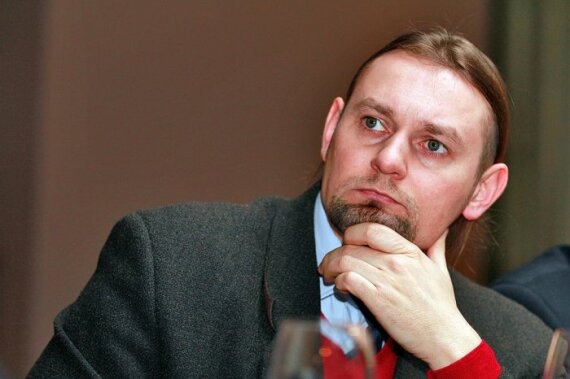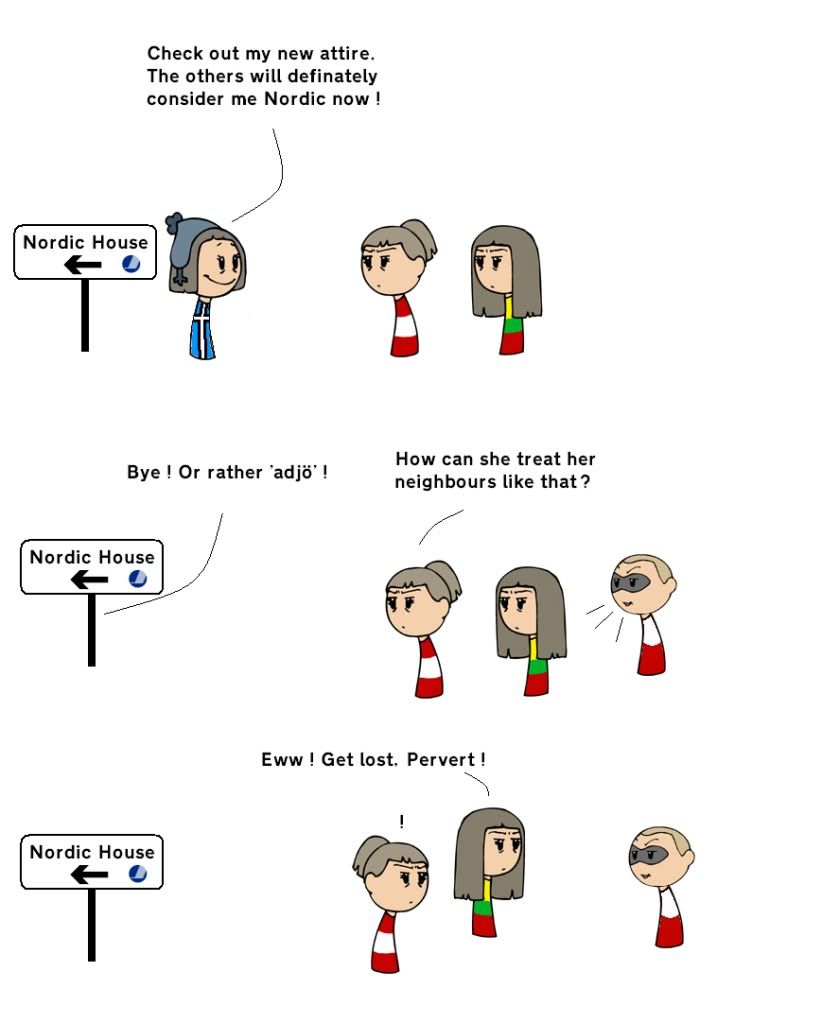Šiek tiek apie kvietimo prisijungti prie NORDEFCO užkulisius:
Proposed Nordic-Baltic Pact Gains Steam

HELSINKI - A proposed Nordic-Baltic defense alliance recently gained an influential backer: the international forum for Nordic economic and security cooperation.
The Nordic Council is lobbying governments to support the objectives laid down in the NB8 Wise Men Report, which urges five Nordic and three Baltic states to unite behind regional rather than national defense policies and speed up regional government and military talks.
"Increased cooperation in Nordic and Baltic defense is an important step in the right direction. It's now time to formalize this cooperation further and confirm Nordic unity in defense," Norwegian Foreign Minister Jonas Store told a Nordic Council session Nov. 3 in Iceland.
Store said the report "makes recommendations which are valid and uncomplicated, and can be easily implemented by governments."
A week later, defense ministers from Sweden, Finland, Iceland, Denmark, Norway and the three Baltic countries - Lithuania, Estonia and Latvia - met Nov. 10 in Oslo to discuss new channels of cooperation to support defense and security in northern Europe. Representatives from Germany, Poland and the U.K. also attended the Nordic-Baltic summit, a first for each.
The report was written by Soren Gade, Denmark's former defense minister, and Valdis Birkavs, the former prime minister of Latvia.
Gade said Nordic defense cooperation needs a whole new mindset.
"This will mean partnering the NATO-aligned Baltic states while creating a level of cooperation that is regional rather than national," he said. "We need to think about forming common defense units and structures, including a common cyber defense platform."
In recent months, the council, and secretary general Jan-Erik Enestam in particular, has warned Nordic governments about the need for new regional defense thinking.
"National defense structures and strategies are fast becoming obsolete to the real needs of regional defense," Enestam said. "The time is near when no Nordic nation will be able to afford to finance a credible national defense. We need cooperation and common solutions."
He cited the rising cost of arms and gear.
"Cooperation becomes of greater importance because these cost increases will deepen the need for more integration in the armed forces of the Nordic countries, which may gradually join together in a Nordic defense union," Enestam said.
Swedish Foreign Minister Carl Bildt said better Nordic-Baltic cooperation will strengthen the region's position within the European Union and globally, and facilitate joint participation in peacekeeping.
"This region of Europe has everything to gain from a closer cooperation in defense between the Nordic countries and its Baltic neighbors," Bildt said. "There are real issues, such as Arctic security, where such a cooperation will be advantageous."
The report also recommends that all eight states in the region should contribute to the EU's Nordic Battle Group in 2011. Such a prospect is unlikely, given that Denmark holds an opt-out on defense with the EU.
It also proposes the creation of a joint Nord-Balt cyber defense strategy, and the establishment of more multilateral defense cooperation, primarily through the Battle Group, in strategic analysis, capabilities, exercises and operations.
The report said the region's militaries could save money through common armaments acquisition and logistics programs.
Regional cooperation might even grow beyond the Nordic and Baltic countries.
"To maintain an operational defense, we must cooperate well with the countries around us," said Norway's defense minister, Grete Faremo.
At the Nov. 10 summit, Britain was represented by Liam Fox, the secretary of state for defense; Germany by Christian Schmidt, the state secretary to the federal minister of defense; and Poland by Zbigniew Wlosowicz, the undersecretary of state for defense policy at the country's Ministry of Defense.
Britain, faced with biting defense budget cuts, clearly feels that strategic partnership initiatives with the Nordic countries, and especially Norway and Denmark, could strengthen national security in its more northern territories, and justify costs in retaining naval and air bases in Scotland that are threatened with closure and downsizing.
"The deepening of our bilateral and multilateral relationships with partners in the Nordic region is well worth exploring. We would like to create a broader framework that makes it easier for both NATO and non-NATO members to have a closer relationship in the region," Fox told reporters in Oslo on Nov. 10.
Proposed Nordic-Baltic Pact Gains Steam

HELSINKI - A proposed Nordic-Baltic defense alliance recently gained an influential backer: the international forum for Nordic economic and security cooperation.
The Nordic Council is lobbying governments to support the objectives laid down in the NB8 Wise Men Report, which urges five Nordic and three Baltic states to unite behind regional rather than national defense policies and speed up regional government and military talks.
"Increased cooperation in Nordic and Baltic defense is an important step in the right direction. It's now time to formalize this cooperation further and confirm Nordic unity in defense," Norwegian Foreign Minister Jonas Store told a Nordic Council session Nov. 3 in Iceland.
Store said the report "makes recommendations which are valid and uncomplicated, and can be easily implemented by governments."
A week later, defense ministers from Sweden, Finland, Iceland, Denmark, Norway and the three Baltic countries - Lithuania, Estonia and Latvia - met Nov. 10 in Oslo to discuss new channels of cooperation to support defense and security in northern Europe. Representatives from Germany, Poland and the U.K. also attended the Nordic-Baltic summit, a first for each.
The report was written by Soren Gade, Denmark's former defense minister, and Valdis Birkavs, the former prime minister of Latvia.
Gade said Nordic defense cooperation needs a whole new mindset.
"This will mean partnering the NATO-aligned Baltic states while creating a level of cooperation that is regional rather than national," he said. "We need to think about forming common defense units and structures, including a common cyber defense platform."
In recent months, the council, and secretary general Jan-Erik Enestam in particular, has warned Nordic governments about the need for new regional defense thinking.
"National defense structures and strategies are fast becoming obsolete to the real needs of regional defense," Enestam said. "The time is near when no Nordic nation will be able to afford to finance a credible national defense. We need cooperation and common solutions."
He cited the rising cost of arms and gear.
"Cooperation becomes of greater importance because these cost increases will deepen the need for more integration in the armed forces of the Nordic countries, which may gradually join together in a Nordic defense union," Enestam said.
Swedish Foreign Minister Carl Bildt said better Nordic-Baltic cooperation will strengthen the region's position within the European Union and globally, and facilitate joint participation in peacekeeping.
"This region of Europe has everything to gain from a closer cooperation in defense between the Nordic countries and its Baltic neighbors," Bildt said. "There are real issues, such as Arctic security, where such a cooperation will be advantageous."
The report also recommends that all eight states in the region should contribute to the EU's Nordic Battle Group in 2011. Such a prospect is unlikely, given that Denmark holds an opt-out on defense with the EU.
It also proposes the creation of a joint Nord-Balt cyber defense strategy, and the establishment of more multilateral defense cooperation, primarily through the Battle Group, in strategic analysis, capabilities, exercises and operations.
The report said the region's militaries could save money through common armaments acquisition and logistics programs.
Regional cooperation might even grow beyond the Nordic and Baltic countries.
"To maintain an operational defense, we must cooperate well with the countries around us," said Norway's defense minister, Grete Faremo.
At the Nov. 10 summit, Britain was represented by Liam Fox, the secretary of state for defense; Germany by Christian Schmidt, the state secretary to the federal minister of defense; and Poland by Zbigniew Wlosowicz, the undersecretary of state for defense policy at the country's Ministry of Defense.
Britain, faced with biting defense budget cuts, clearly feels that strategic partnership initiatives with the Nordic countries, and especially Norway and Denmark, could strengthen national security in its more northern territories, and justify costs in retaining naval and air bases in Scotland that are threatened with closure and downsizing.
"The deepening of our bilateral and multilateral relationships with partners in the Nordic region is well worth exploring. We would like to create a broader framework that makes it easier for both NATO and non-NATO members to have a closer relationship in the region," Fox told reporters in Oslo on Nov. 10.
 Nuo to saugiau nebus, jei skirsime net ir kelioliką procentų.
Nuo to saugiau nebus, jei skirsime net ir kelioliką procentų.


 Nematau prieš ką ginkluotis
Nematau prieš ką ginkluotis  Man iškart pasiūlymas prisijungti pasirodė lyg koks sapnas - sunku buvo patikėti.
Man iškart pasiūlymas prisijungti pasirodė lyg koks sapnas - sunku buvo patikėti.








Comment